05 Apr East Africa — Mooching along with a Pig Farmer – 2
The only section of road from Cape Town all the way to Alexandria that isn’t paved is a stretch of one-lane dirt from Nairobi to Addis Ababa.
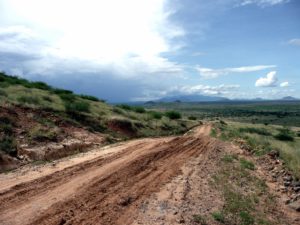
The highway from Nairobi to Addis
During the rainy season, it isn’t even dirt . . . which we discovered when the guided missile carrier lost its grip and spun three or four times balancing on the wheels to the left, then rocking the other way and balancing on the wheels to the right before shuttering to a stop, cargo door jammed into the road cut behind us, front facing across the highway, and all four wheels up to their hubs in mud. Mud too gluey and too deep for even a specially-built Land Rover to muscle its way out of.
We found a handy tree and winched ourselves out. An hour or so later we used the winch again, this time to haul out a pickup truck full of Africans who were even stucker than we’d been.
The drive was turning out to be slower than we’d guessed from looking at the map, night closed in and there weren’t any lights outside at all, electricity not having reached this part of the world. After a while there weren’t any lights inside, either. The alternator had quit alternating, we’d been running on battery, and the battery had given out.
“Yep, battery’s dead,” the pig farmer said, sounding amazingly undismayed. The next settlement was forty kilometers farther up the road.
Forty kilometers, I thought. We could walk forty kilometers. If we had to.
If we were on a dry road we could walk forty kilometers. In the daylight. At night, out here, we could walk, maybe . . . .
Before I could figure out how far we could walk, maybe, I was interrupted by honking and laughing. A pickup truck had pulled in front of us, Africans jumped out and hitched a tow. They hauled us the forty kilometers and dropped us off at a camel ranch that took in overnight guests. They were the same Africans in the same pickup we’d pulled out of the mud a few hours earlier.
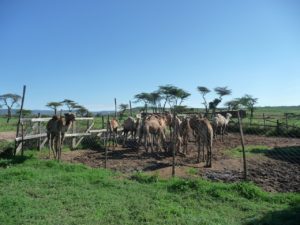
Camels at a camel ranch that takes overnight guests
A camel ranch in one of the rainiest places in Africa? The idea didn’t make any more sense at the time than it does writing about it now. And they took in overnight guests? Whatever, it was good to be there.
The next morning we still had to deal with the alternator. “No worries,” the pig farmer said and lifted a hatch inside the guided missile carrier. “I have spares,” and he was right. He had parts hidden everywhere: behind panels, inside secret compartments, beneath a false floor. It was as if he was some kind of auto-parts smuggler. By noon he had the new alternator installed, the battery charged, and us back on the road.
Somewhere north of the camel ranch we left the main road and headed west toward Lake Turkana. Driving didn’t get easier.
By then, the pig farmer had run out of people he had standing invitations to stay with. This probably had something to do with the fact that almost nobody from the outside has ever met anybody who lives around Lake Turkana. The night before we reached the lake we slept in a commercial campground.
The next morning, the guy who ran the place told us he didn’t see any problem with the direction we were traveling. “Folks go that way sometimes.”
“So . . . you know people who’ve been through there?”
“Most of them don’t have any trouble.”
“Most of them?”
“Only four have been murdered.” He thought a minute. “That I heard about, anyway.”
“Those four. . .” I was trying to calculate the odds of becoming numbers five and six “. . . were on the same trip?”
The guy just looked at me.
“Weren’t they?”
“No,” he shook his head. “Different trips.”
“No worries, Mate,” a helpful camper said. “We just came from up there.”
“Good enough,” the pig farmer said. “We’ll depart as soon as . . . .”
“Hey,” the camper said when we turned to go. “Want to see some pictures of a dead white girl floating in the lake?”
An hour or so from the campground, the road petered out entirely and we set out across bush country guided by a GPS loaded with something called Africa Tracks.
Africa Tracks may have been the unlikeliest navigation system ever marketed. The idea seemed to have been to crowdsource information by outfitting adventurous drivers with GPS’s, then recording where they went when they headed from, say, one out-of-the-way place in Kenya to an equally out-of-the-way place in Ethiopia . . . which suited our situation pretty well. At least in theory.
In practice, Africa Tracks led us along the same meandering route a previous driver had taken, sometimes doubling back when he realized he’d run out of whiskey and had to retrace a couple of hundred kilometers to civilization and stock up, or veered into Uganda to visit his sister, or deadheaded across a sun-beaten pan which, in the season we were there, was filled with water and marsh birds and hippos to the horizon in three directions. Still, the pig farmer had paid good money for the thing, we were in his guided-missile carrier, he was the one with the car keys, and we kept heading west. When we reached Lake Turkana, we turned north and kept the water on our left.
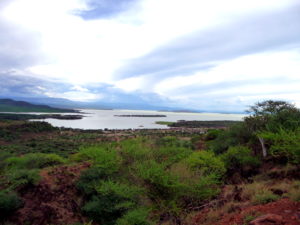
Somewhere out there is a dead white girl
For three days we didn’t see any sign of anything with a wheel. Not a bicycle. Nor a wheelbarrow. Not an ox cart. The only round things were peoples’ homes spread across fields of gravel.
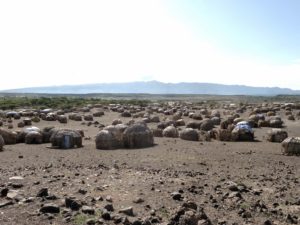
Why the pig farmer had never met anybody from this part of the world
The people who lived there looked as if they’d never been visited by a missionary, nor even so much as tasted Coca-Cola.
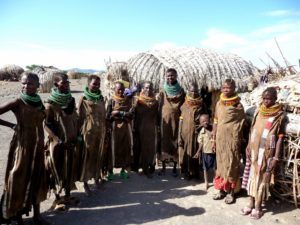
New friends the pig farmer has a standing invitation to stay with
Partway up the lake we came to Sibiloi National Park where Richard Leakey’s team unearthed a one-and-a-half-million year-old hominin they called Turkana Boy. We arrived the evening of something like the one-hundred-and-seventy-fifth day of the year. We were visitors ninety-one and ninety-two. For the entire year. We also had to pay twenty dollars.
“Twenty dollars?” the pig farmer said. You don’t get to be a pig farmer traveling around Africa in a guided missile carrier by wasting money. “Why should we pay twenty dollars to go through the park when the map clearly shows we should be going around?”
“Because we’re rich white guys,” I said.
Because this is a UNESCO World Heritage Site, but I didn’t say that.
Because it’s one of the coolest places in the world. And because we’re HERE. I didn’t say any of that, either.
“Because the map is wrong.” I did say that. “And there isn’t any road around the park.”
Several hours later we began passing rusted-out Land Rovers. Apparently, Leakey’s people had gone through a lot of them. When a Land Rover wore out they’d take it to the edge of the settlement and, in true ancient-peoples’ style, abandon it.
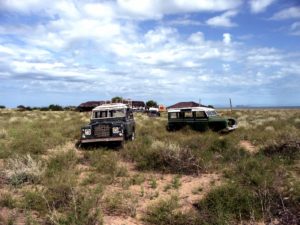
Traces of a half-remembered technology
Next, we came to the settlement itself. Populated, now, by a couple of kids who’d wandered over from . . . it was hard to figure where they’d wandered over from because there wasn’t any human activity nearby. At least not that we could see.
The walls were rotting and overgrown, the roof was sagging and the paths weren’t paths, anymore, just weeds. But, as a capsule of bygone human activity it was first-rate. Land Rovers and Land Rover parts were scattered everywhere, especially in a big, rusty midden beside a broken-down shed.
Automobile paleontologists would have divided the area into meter-square sections, taken thousands of photographs, and gone to work with brushes and dental picks and plaster of Paris. The pig farmer couldn’t have been happier if we’d been at Troy VII (b) and stumbled across Priam’s treasure.
“This must be the crankshaft from a Series II. Late Fifties, I reckon.” He squatted in front of a rusty piece of metal. It was a reverent sort of squat as if he was afraid of disturbing the record by touching anything. “And this . . . from the shape of the linkage it looks like . . . it is . . . a steering column from a Series I. Ran on petrol, you know. Not diesel. Didn’t make many of those. Couldn’t be anything else, not from the cut of the gear teeth.”
There was genuine academic knowledge in that scrap pile, but I wasn’t paying as much attention as I should. A seedy-looking character was homing in on us.
He was the government caretaker, he said so himself, and we needed to pay him if we wanted to visit these very historic ruins. His government uniform consisted of a torn pair of shorts and a ragged T-shirt with an elephant face on the front. The elephant face was the logo of Tusker Beer. “Just follow me to my office over here,” he pointed to the darkest and most tumbled-down end of the shed, “where I can take your money.”
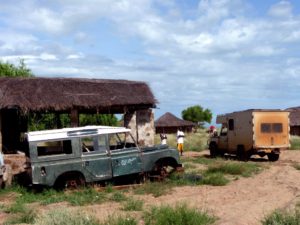
The Caretaker’s office is behind yet another abandoned Land Rover . . . along with a couple of unattended kids
“Time to go,” I tapped the pig farmer on the shoulder. That taking our money sounded too real.
“Good Lord, this is the differential from a . . . .”
“Now,” I tapped harder. “We need to go. Now.”
“You need to step into my office,” the government caretaker said.
With that guy hovering over us, it didn’t seem like a good time to explain why we had to leave, only that we really, really had to. “These Land Rover parts,” I said. “You know we can’t take them.”
“Now,” the caretaker said.
“You’re right,” the pig farmer sighed. “We can’t take them.”
“Might as well leave,” I said.
“NOW,” the caretaker said.
“NOW,” I said. And led the pig farmer to the guided missile carrier.
“Perhaps we can eat lunch here,” he said, not wanting to put too much distance between himself and the Land Rover parts.
“Perhaps we can find a nice spot by the lake,” I said.
“All those Land Rovers,” the pig farmer said as we drove off. “So many Land Rovers.”


No Comments